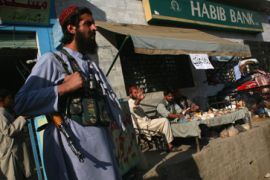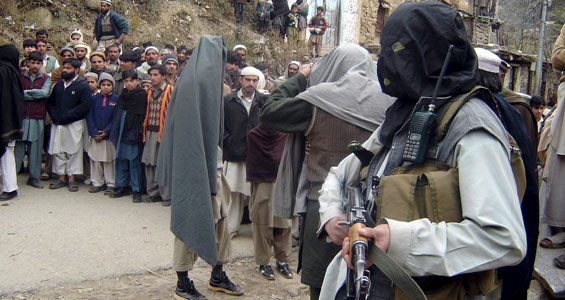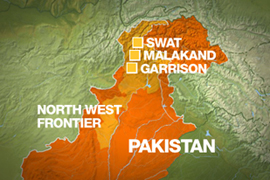Talking to the Taliban
The US wants dialogue with “moderate” leaders but are they minded to respond?

 |
| Islamabad has been accused of caving in to Pakistani Taliban demands [EPA] |
Barack Obama, the US president, has hinted at holding talks with “moderate” elements of the Taliban, but are they willing to engage?
The Pakistani Taliban, black-turbaned and bearded, stand in full view of the public.
One grips a rocket launcher, and casually leans against a wall. Another, his AK 47 assault rifle slung underneath his arm with the safety trigger off, smiles.
These are men who would like you to think, at least, that they are prepared for anything.
But are they prepared for peace?
This was the scene I saw on a recent trip to the Swat valley. Once a tourist haven, it is now controlled by the Pakistani Taliban and visited, very rarely, by journalists.
But more than anything else, this ancient valley and what happens here could have crucial effect on the US’s fortunes in neighbouring Afghanistan.
Barack Obama, the US president, has said success in Afghanistan involves more than just troops. He talks of reaching out to people who are, in his words, “Islamic fundamentalists”.
That is exactly what has happened in the Swat valley and Bajaur; key battlegrounds in Pakistan’s North West Frontier Province.
The Pakistanis, involved in a bitter battle with the Taliban for a number of years, have began to realise that military force alone will not win the war.
Stalemate
According to most experts in Pakistan, the battle was at a stalemate. So, in a move that surprised and concerned Pakistan’s friends in Washington, they reached out to the Taliban in the Swat Valley through the use of intermediary Mullah Sufi Mohammed.
It was a risky gesture. The mullah had spent time in jail for commanding fighters in cross-border raids into Afghanistan. He is avowedly pro-Taliban and religiously conservative – exactly the type of man who has made life difficult for the Americans in the past.
Yet the Pakistanis took the decision to engage. They found in Sufi Mohammed a moderate cleric they could do business with. He in turn sat down with Mullah Fazlullah, leader of the Pakistani Taliban in the Swat valley, and talked.
Sufi Mohammed had an advantage; Mullah Fazlullah was his son in law and here that relationship matters.
However, according to General Talat Masood, a retired Pakistani army lieutenant, the Pakistanis had little choice. They had to do something as their war in the Swat Valley was losing support domestically, as well as draining resources for very little return.
“At least three times the Pakistan launched a major offensive in the Swat Valley, but it was the follow up that was poor and after each offensive when the army left the Taliban came back, and came back in major strength,” he says.
After intense negotiations a peace deal was signed and Pakistan breathed a little more easily.
Fragile truce
 |
| The Taliban have waged war with the Pakistani army over control of the North West Frontier |
So far it has been a fragile truce with one journalist killed and the government’s top administrator kidnapped briefly. It could yet fall apart over a key sticking point – the implementation of Sharia, or Islamic law, in the valley and what form that could take.
The peace deal has also attracted criticism from those who believe Pakistan has given up too much and that the armed group has won.
Crucially, though, the ceasefire is holding. The markets are busier and people forced to flee their homes are returning slowly to rebuild lives. The Pakistani army is now in a reactive, rather than aggressive, mode and policemen are back out on the streets.
According to Swati resident Nawab Ali the peace deal is welcome: “It’s something. If the Taliban stick to it then yes, I am hopeful, I hope it lasts.”
It is a hope shared by many.
Moderates’ fears
The US has been watching this deal closely. But can they replicate it in Afghanistan? Are there “moderate” Taliban they can reach out to?
Talat Masood, the retired army lieutenant, is sceptical: “The leadership of the Taliban in Pakistan and Afghanistan is in the hands of people who are not moderate.
“There are moderate Taliban but they won’t talk for fear of offending the senior leadership, and this is the problem the Americans face.”
There is also mounting evidence that the peace deal struck in the Swat valley and the neighbouring Bajaur agency may conceal another – for the US at least – dangerous agenda.
Three of Pakistan’s top Taliban leaders have come together to form what they have called a The Council of United Holy Warriors.
The men were once bitter rivals: Baitullah Mehsud, Hafiz Gul Bahudar and Maulvi Nazeer fought Pakistani troops and favoured their Jihad against them.
Together they control huge swathes of North and South Waziristan, The lawless tribal region that sits next to the Paktia, Paktika and Khost Provinces in Afghanistan.
That is a region that has seen some of the most intense fighting between the Taliban and US and Coalition forces.
Exporting the fight
In Bajuar, Maulvi Faqir Mohammed, a Taliban spokesman, has told Al Jazeera that they will take their fight to Afghanistan instead of the Pakistani army.
The reason for this change in tactics? Afghan Taliban leader Mullah Omar.
Omar has reportedly been watching events in Pakistan with concern. He is said to have dispatched a high-level delegation to Taliban fighters with a simple message: “Unite and fight not your own people, but the occupiers of Afghanistan.”
It would appear that message has now being heeded and that may be the real reason the Taliban have decided to engage in the Swat valley and Bajuar.
This is a real issue for the Americans who want to reach out to the Taliban.
According to Masood, the US is weak. “It’s in no position to negotiate with anyone. The Taliban have made it clear that peace talks cannot take place without the occupier first leaving Afghanistan.”
Perceptions
It is that perceived weakness that many say has led the US president to talk of alternative strategies.
It may not be that easy, however. Any peace deal with the Taliban has to include men like Mullah Omar and Baitullah Mehsud. Hardliners who are no mood to compromise.
By wondering aloud whether there are moderates he can talk to, the US president has shown he is taking advice from those who have long advocated a more reconciliatory approach.
But, rather predictably, peace in Afghanistan and Pakistan is more complicated than just talking to the Taliban.
It is a widely held view here that Pakistan needs the Taliban to remain strong in Afghanistan in order to thwart any plans their traditional rival India has in the region.
The US has long accused Pakistan of playing a double game when it comes to the Taliban – one that sees them publicly back the so called “war on terror” but privately need the Taliban as a strategic asset. It is a charge the Pakistanis deny.
Experts also say the Pakistanis are well aware that one day the US and coalition forces will leave Afghanistan. Pakistan will need all the influence it can muster if it is to have a say in future Afghan affairs.
Sources have also told Al Jazeera that despite the peace deal in the Swat Valley, the Taliban still have training camps and are sending young men into Afghanistan to fight. That is something the US has long feared would happen under any peace deal.
Facing challenges
The US now has a serious challenge on its hands. Finding moderates to talk to will be difficult and the US may well be asking for too much. It will want the Taliban to lay down arms, drop its support for al-Qaeda and participate in the democratic process it hopes will take root in Afghanistan.
All things the Taliban on both sides of the border may not be willing to do.
As the drone attacks continue in Pakistan and Taliban fighters mount raids on US forces and both Pakistan and Afghanistan face political crises at home, domestic conditions for dealing with the Taliban are rapidly deteriorating.
It would seem the US has made a bold leap in its thinking. Translating that into action, however, may prove to be difficult.